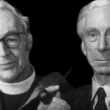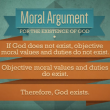Abortion Ethics: Natural Law vs. Naturalism
by Dr. Dennis Bonnette
Filed under Morality, Natural Law

This article will examine (1) natural law’s and (2) naturalism’s opposing views on abortion. Their diverse philosophies determine radically divergent abortion ethics, which will be examined solely through natural reasoning. Pertinent Thomistic Doctrines Since embryology teaches that specifically human life begins at conception, modern natural law ethics – following the principles of St. Thomas Aquinas (1225-1274) – prohibits direct abortion at any stage, since it is the... Read More
Why Natural Law Ethics is Rational
by Dr. Dennis Bonnette
Filed under Morality

This article will lay out the rational foundations of natural law ethics as well as show how they lead to implications for the philosophical science of ethics. Everyone thinks he is an expert in ethics – or, so it seems. Just ask anyone’s opinion about any hot topic, like abortion, the homosexual agenda, the proper response to climate change, or the death penalty, and you will elicit strong judgments as to what we are obliged to do or not do. Rarely does someone say, “Who... Read More
Just What Are Men and Women, Anyway?
by Joe Heschmeyer
Filed under Anthropology, Sexuality

Sometimes, the most important questions are the basic ones. Back in 2011, I argued that the most important question in the gay-marriage debate was “What is marriage?” The next year, Robert George, Ryan Anderson, and Sherif Girgis published a book exploring just that question: What Is Marriage?: Man and Woman: A Defense. But in the face of contemporary questions of transgenderism and gender identity, it turns out that we need to ask a yet more-basic question: what... Read More
The Most Famous Debate on the Existence of God
by Brandon Vogt
Filed under God, Morality

On January 28, 1948, the BBC brought together two of the century's brightest minds for a radio debate about the existence of God. To be sure, the debaters were not just lightweight showboats, blowing off steam. The two men represented the cream of the intellectual crop. Bertrand Russell was a renowned British philosopher, mathematician, historian, and perhaps the world's leading atheist at the time. He authored many skeptical essays and books, including the collection still popular today, Why... Read More
Getting Morality Wrong
by Joe Heschmeyer
Filed under Morality

Back in April, Gail Dines, a sociologist at Wheelock College in Boston, wrote a Washington Post piece arguing that pornography is a public health threat, regardless of its (im)morality: The thing is, no matter what you think of pornography (whether it’s harmful or harmless fantasy), the science is there. After 40 years of peer-reviewed research, scholars can say with confidence that porn is an industrial product that shapes how we think about gender, sexuality, relationships, intimacy,... Read More
Learning Morality from Bill and Ted
by Brandon Vogt
Filed under Christianity and Science, Morality

Early in this review series, I mentioned how Sean Carroll's new book, The Big Picture: On the Origins of Life, Meaning, and the Universe Itself (Dutton, 2016), gradually becomes weaker as you move through the chapters. It starts off strong and invigorating as he talks about cosmology and fundamental physics, his specialities. But as he moves into the philosophy of mind, meaning, and morality, he gets a bit wobbly. Moving From Ought to Is That's evident especially in his chapter on "What... Read More
Atheism, Prot-Enlight, and the Schizophrenic Republic
by Timothy Gordon
Filed under Atheism, Natural Law

Last week, I wrote about the longstanding Catholic drive to reinterpret the philosophy of Plato as realist. In actuality, Aristotle’s philosophy perfected Plato’s by connecting the material to the formal world—two separated domains which, in Plato, remain wholly alien to one another. Accordingly, it is quite a “stretcher,” I suggested, when Catholics talk about Plato as a realist. Any philosophy which divorces the material and the formal qualifies as anti-realism, because matter’s... Read More
What Do You Think of the Moral Argument for God?
by Brandon Vogt
Filed under Morality, The Existence of God

NOTE: We recently kicked off a new series of posts, each introducing a popular argument for or against God, followed by open-ended discussion. The goal is not to offer a thorough defense or refutation of the argument in the original post, but to unpack it together, as a community, in the comment boxes. The first argument we discussed was Alvin Plantinga's modal ontological argument for God, then we looked at the kalam cosmological argument. Today, we'll look at the moral argument for God. The... Read More
Bill Nye the Unscientific Abortion Guy
by Trent Horn
Filed under Morality, Science
This past weekend former-educational-TV-star-turned-science-advocate Bill Nye posted a video about abortion on Big Think. Nye attempts to use science to resolve the debate about abortion and arrives at the following conclusion: “When it comes to women’s rights with respect to their reproduction, I think you should leave it to women.” The video is a perfect example of Maslow’s Hammer, or the saying, “If all you have is a hammer, everything looks like a nail.” In this case, the... Read More
Why Your Life Does Not Belong to You
by Bishop Robert Barron
Filed under Atheism, Morality

It was revealed this week that, for the first time in its history, Harvard University, which had been founded for religious purposes and named for a minister of the Gospel, has admitted a freshman class in which atheists and agnostics outnumber professed Christians and Jews. Also this week, the House and the Senate of California passed a provision that allows for physician assisted suicide in the Golden State. As I write these words, the governor of California is deliberating whether to... Read More






